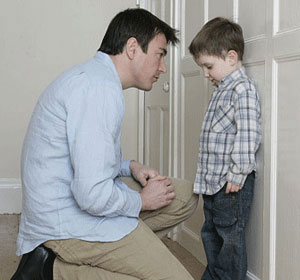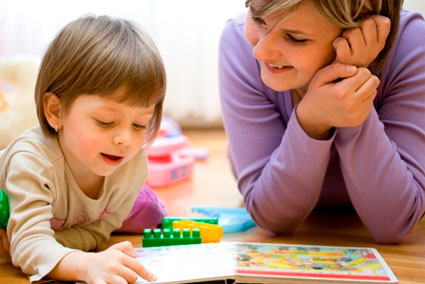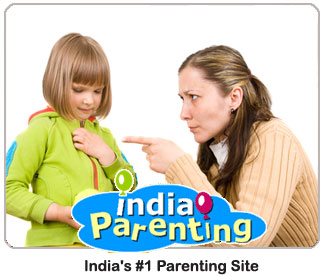The need for discipline
When children are born, they are like blank slates on which their parents' help to script the beginnings of the stories of their lives. Every child grows up and ultimately charts his own destiny, but his parents lay the foundation. And everybody knows the consequences of building on a weak foundation. Disciplining your children is one way of setting them on the right path and equipping them to wing it on their own.
Disciplining a child is comparable to walking a tightrope. Parents have to maintain a delicate balance between over-indulgence and authoritarianism. However, parents often do not perceive discipline as being such a delicate business. For most parents, discipline operates on a simple principle. If the child does not meet the standards of 'good' behaviour set by the parents, he must be disciplined. This is one way of looking at it. The child that does not tidy his room or one that throws a tantrum, or one that talks back to his parents-all of them must be disciplined. But these are short-term goals that shift from situation to situation. Disciplining is not only about showing your child who's the boss. This is a very shortsighted approach. In general, people do not react favourably to criticism and children are no different. If a child is frequently criticized by a person whose opinion he values (in this case the parent), he may lose confidence in his judgement and actions. So parents have to realize that discipline is about more than getting your child to clean up his room or controlling a tantrum.
In the long run, disciplining your child is aimed at teaching him to internalize the standards of behaviour so that he can be the judge of his own behaviour and realize what is acceptable and what is not. Parents have to teach their children what is good as well as what is bad. Therefore, discipline does not merely involve correcting their mistakes, but also showing them the right thing to do. Thus discipline does not have to be just a negative process, but with constructive criticism it can become a positive experience. Parents want to discipline their children in such a way that their children don't view them as the enemy and understand that disciplining stems from love and concern. Parents also want to raise children who understand the consequences of their actions and take responsibility for them.
Styles of discipline
Parents adopt different styles of discipline. Some adopt a Hitlerian attitude - the authoritarian approach. These parents convey the message that their word is law. This approach does not encourage questions or feel the need for justification. While on the surface, this approach may seem highly effective, the fact is that it encourages blind obedience. Children obey their parents' orders out of fear and without really understanding why they are forbidden to do certain things or have to do other things.
At the other extreme you have the permissive parents who operate on the premise that a child is a rational, sensible human being and should be treated as such. These parents encourage their children to participate fully in any decisions involving their actions and other things that affect them. These parents do not issue orders, but encourage discussion. While such parents have all good intentions, they do not make very good disciplinarians. The fact remains that children cannot be treated as equals, because they are not. They need the advice and guidance of their parents. Parents who follow this style of discipline actually fail to provide guidance to their children in that they do not set any standards for them. They expect their children to judge their own actions when they are not qualified to make such judgements.
The authoritative parent is one that has probably achieved the balance required on the tightrope of discipline. This parent lays down the rules, but explains the reasons behind these rules. Their children thus understand why they should obey their parents. These parents tell their children that they must do this or that not merely because they say so, but for a specific reason. The children thus establish the connection between their actions and their consequences and build a solid foundation on which they can base their future judgements. Such parenting also makes the children feel that their parents respect their feelings because they bother to explain and justify the rules and regulations that they impose on their children.
Positive discipline
The key to success is for parents to establish their authority over children without putting them on the offensive and getting into a power struggle. Children, just like other people, do not react well to taking orders. The instinct is to rebel and the parents' automatic reaction is to exert further pressure and bend them to their will. This can degenerate into a losing battle with both sides feeling angry and humiliated. The children must get the message that discipline stems from caring and is for their own good.
Many times children can drive their parents to distraction with their naughtiness and disobedience. On such occasions, parents may see no other option but to give their children a good spanking or a strict dressing down. While this does not cause serious damage if it is a rare occurrence, it has been observed that children whose parents discipline them by hitting, nagging, or shouting at them on a regular basis, have a tendency to be more violent and aggressive than other children who are disciplined through other means.
Another important thing that parents should keep in mind is that when they rebuke their children, they should make them understand that it is a specific behaviour that is under criticism and not the child himself. The child must feel that he is not a bad person, but that he has not behaved correctly in a particular situation.
There is no point laying down rules if parents do not enforce them. This means that children must be punished every time they break the rules laid down by their parents. However, punishment should not be used as a personal vendetta against the child for disappointing or disobeying the parents. It should also not be aimed at making the child feel guilty or bad. Punishment should be aimed at making children understand the consequences of their actions and to take responsibility for their actions.































